#Jennifer wright Knust
Text
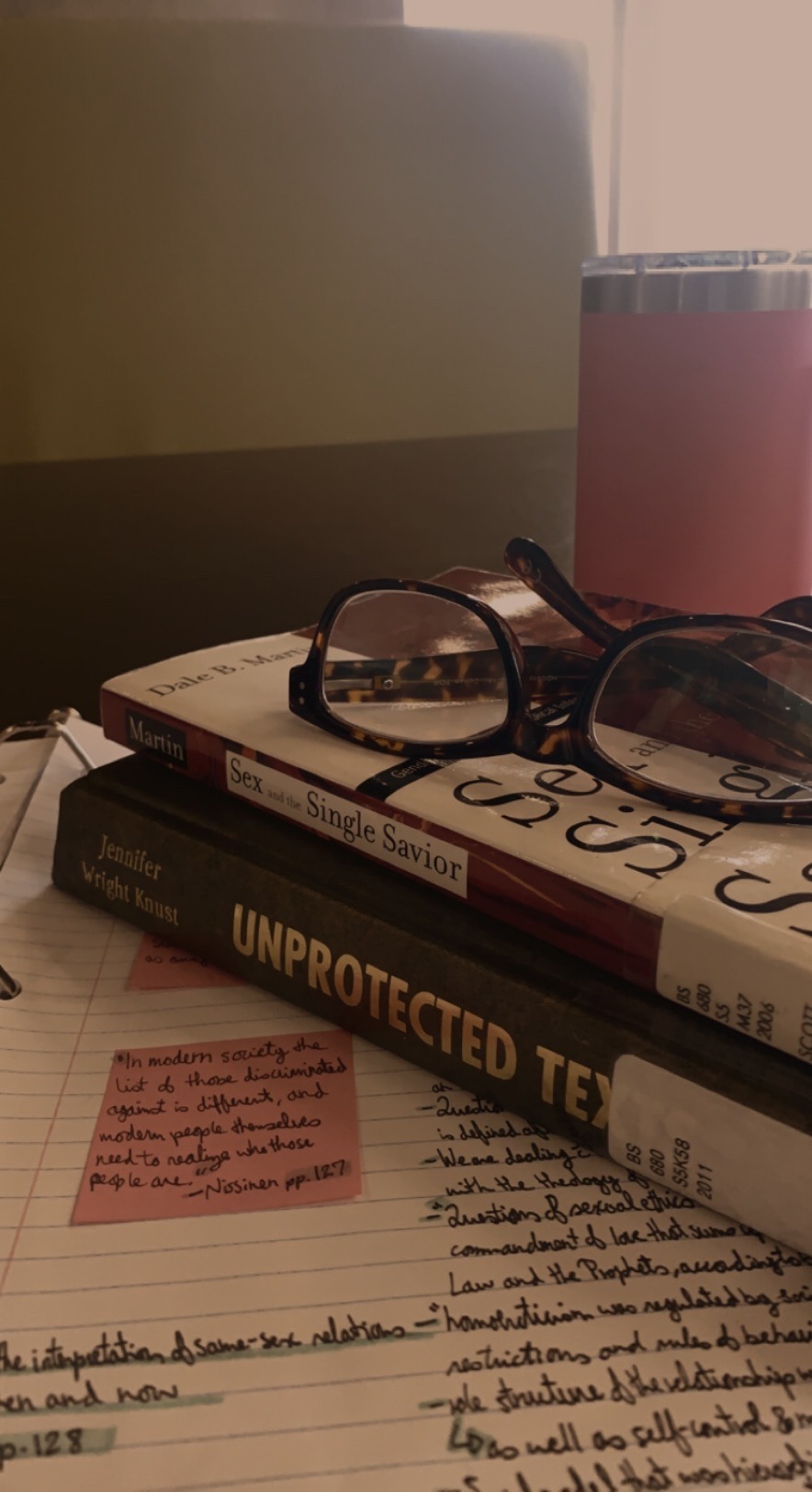
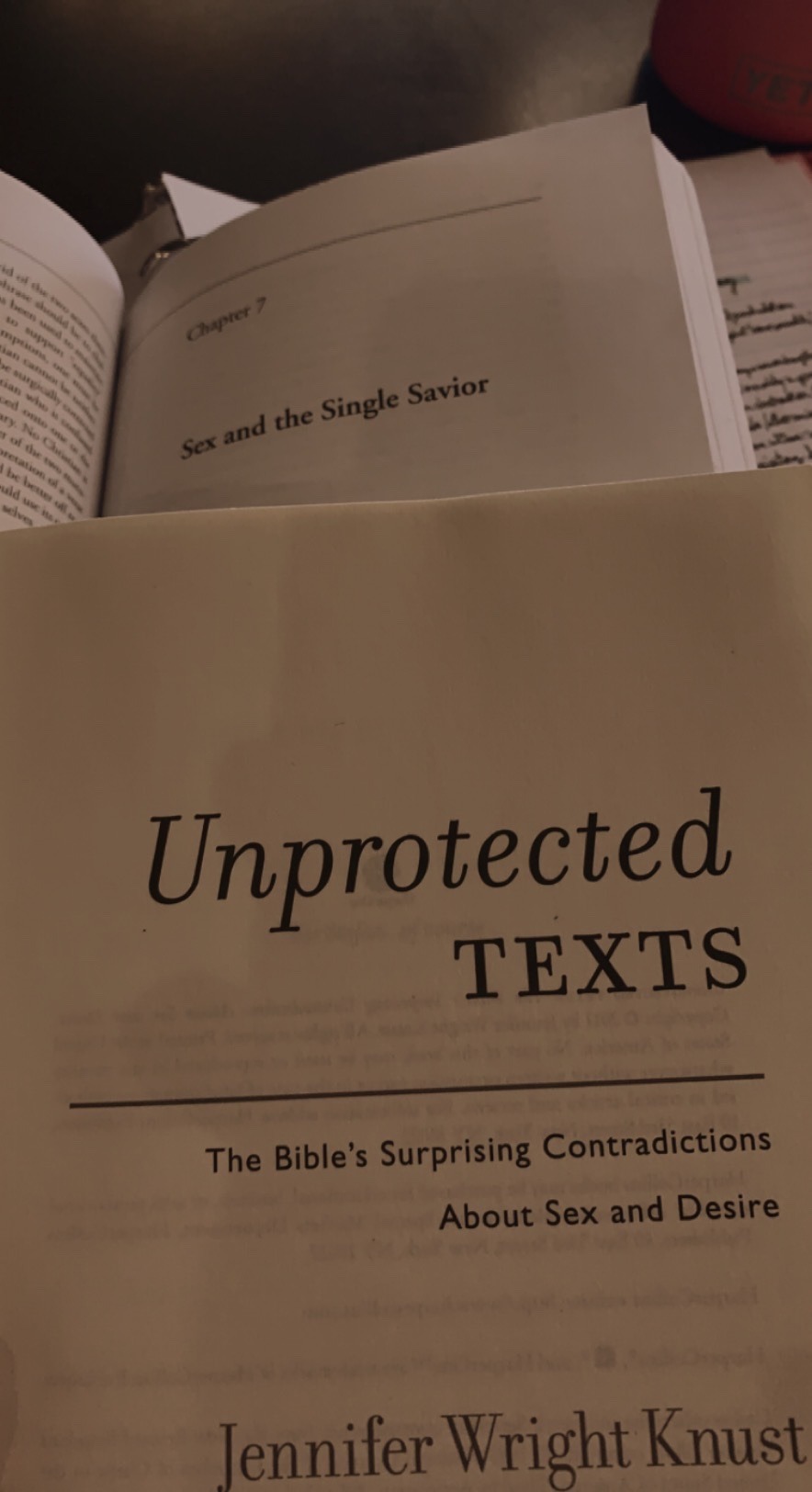
Studying some unprotected texts in the collaboratory in the library. I feel good this afternoon. I went back to the gym for the first time in a week and got a pretty decent workout done.
The reason I had to skip my workouts last week was that I had my second BA Thesis paper due. I got my mark back and I got a B, which is good. My advisor said he liked my writing style, which is great.
I’m aiming for an A on my next paper, which is also my last one. I think finishing on a high note would be nice.
#aelstudies#ba thesis#workout#circuit training#unprotected texts#Jennifer wright Knust#sex and the single savior#Dale B. Martin#dark academic aesthetic#dark academia#university studyblr#studyblr#study motivation#university motivation#university#university student#university studyspo#studyspo
24 notes
·
View notes
Text
reading a really spectacularly bad book on biblical sexual ethics
#unprotected texts by jennifer wright knust#went into it still buzzing from shameless by nadia bolz-weber (which i recommend) but it’s. like shockingly bad. mostly the stuff on paul
2 notes
·
View notes
Text
The Talk in Three Phases: Part 2 — Black is Beautiful
Sunday Evening Thoughts
February 16, 2020
Dear Rachel and Paul,
Black is Beautiful
I am dark but desirable,
O daughters of Jerusalem,
like tents of Kedar,
like Solomon’s curtains.
Do not look on me for being dark,
for the sun has glared on me,
My mother’s sons were incensed with me,
they made me a keeper of the vineyards.
My own vineyard I have not kept.
Tell me, whom I love so,
where you pasture your flock at noon,
lest I go straying
after the flocks of your companions.
—If you do not know, O fairest of women,
go out in the tracks of the sheep,
and graze your goats
by the shepherd's shelters.
Song of Songs 1:5-8 (Translation by Robert Alter, The Hebrew Bible: A Translation with Commentary)
It has been a difficult three weeks deciding which texts from the Song of Songs to analyze in detail. It is very easy to choose libidinous texts like “Your eyes are like doves,” or “Your hair is like a herd of goats,” or “Your teeth like a flock of matched ewes” (that will get you a date!). But in the current trend if you said to anybody other than your girlfriend, “Your two breasts are like two fawns” or “Your lips nectar” or “Your robes the scent of Lebanon,” you will probably get arrested. On the other hand, if she says, “Let my lover come to his garden and eat his fruit,” I interpret that as a “Yes!”
Remember the author of Song of Songs takes each person and has the other describe the physical characteristics of the other in pastoral nature-terms from the top of their head to the bottom of their feet, and yes, every body part. But I’ll leave that for you to play with… the text, the text... no pun intended!
Full disclosure: Very little of the exegesis I am providing is my original thought. 99% of it comes from Robert Alter, Professor of Hebrew Languages at U. of California, Berkeley, and author of The Hebrew Bible: A Translation with Commentary; 50% comes from Michael Coogan, Professor of the Semitic Library, Harvard University, and author of God and Sex: What the Bible Really Says; and 45% from Jennifer Wright Knust, Professor of Religious Studies at Duke University, and author of Unprotected Texts: The Bible’s Surprising Contradictions about Sex and Desire. How does it add to more than a 100%? Because by-and-large, all three agree on the meaning behind the texts in Song of Songs.
Song of Songs 1:5-8 is fascinating. So let’s start…
“I am dark but desirable” opens this section with an interesting disclaimer. Is it a protest or an attribute? The ancient beauty of black women like Cleopatra, Nefertiti, and the Queen of Sheba are well known. Historians disagree on the “blackness” of each of these women, but all are historically known as being beautiful, strong, black women.
Still, why the conjunction “but”? Why is darkness viewed as less desirable? It is interesting that even today in many parts of the world the darker a woman is, the lower the social class she is thought to be associated with. But, before we judge people in countries that subscribe to that notion, Michelle Alexander points out in her book The New Jim Crow that Americans are in many ways worse, because we legalize it into our way of life by legislating exorbitant fees and jail time for petty traffic violations in Southern American cities that keep black Americans impoverished. This happened to a black, female Thinker here in Hampton Roads. Nevertheless, the female protagonist in Song of Songs confidently thinks of herself as “hot”!
“O daughters of Jerusalem” or in popular vernacular, “Listen you rich, white, city bitches, don’t think of yourself better than me.” Sorry for the aggressive tone, but I’m trying to be honest to the text. This is interesting in a couple of ways: Not only is she defending herself of her phenotypic characteristic, but she is also supporting the rural, agrarian view v. the city slickers. Why is this important? When I asked a Thinker who works in the Middle East, what is the real cause behind the civil war in Syria, they said that it is very much an economic battle of city v. rural, manufacturer v. farmer, or in reality, who controls the prices of goods. When farmers in Syria tried to raise their prices, Assad (the government) rejected buying it for their asking price. This led to the collapse of the rural economy. Assad then offered to buy farm goods at a guaranteed price to which the farmers agreed, but then raised the prices of fertilizers and other necessary farming manufactured goods to grow and produce the raw farm goods or food. This led to more protests of farmers, which then started to spread to suburban dwellers, because farmers could not pay for their purchases, which led to protests in the cities. And before you know it, the farmer, the small business person, and lastly, the poor city dwellers are being bombed by Assad with the help of both Russia and the U.S., all the while ISIS grows as an apocalyptic response to the societal problems created by greed, or in biblical terms the “daughters of Jerusalem.”
Welcome to the real world today! … and in ancient times!
“Like tents of Kedar, like the curtains of Solomon” refers again to darkness, blackness. She is as black as the tents of Kedar. Kedar is a nomadic, dark skinned, Arab tribe which to this day, Arab Bedouins make their tents out of black goat's hair. And according to Alter, the root of Kedar q-d-r is the same root for black or darkness in Hebrew, thus a play on words which is lost on most of us. “The curtains of Solomon” were certainly viewed as cloth of royalty and beauty. Thus again, a playful poetic image, “she is as black and rough (in a feminist sense) as the tent of nomads, but as beautiful and exquisite as the finest fabrics of Solomon’s.” Alter also notes there are some sexual insinuations in this too. She can be as aggressive in bed as necessary to achieve her own sexual satisfaction, but can be as gentle as necessary for him to achieve his too. In this last sense, a poetic juxtaposition of parallel images.
“Do not look on me for being dark, for the sun has glared on me, my mother’s sons were incensed with me, they made me a keeper of the vineyards. My own vineyard I have not kept.” Again the female protagonist cries out for equal justice. She is black because she is made that way. And although her brother’s were incensed — “incensed” has the same root as “sun glaring,” thus again a Hebrew play on words referring to things being burned or blackened. She responds that they want to keep her locked up and maintain her virginity, but she responds she is her own self and has not kept her “vineyard.” Of course in an economic sense, they want her to work for them, thus she cannot be free economically to be self-fulfilled financially.
“Tell me, whom I love so, where you pasture your flock at noon, lest I go straying after the flocks of your companions” is a little tease on her part. “‘Hey babe, what are you doing this afternoon?’ she inquires with a shy smile. ‘A woman has certain needs too that must be fulfilled,’ she jests, ‘or should I call one of your friends?’ she says rhetorically.” Note the nature words used - pasture, flocks, attending sheep, creating images of pastoral scenes used in European art of the 1800’s and 1900’s through the American pastorals of the mid-20th century.

(Andrew Wyeth’s “Christina’s World” shows a pastoral scene of an unfulfilled woman longing for more.)
“If you do not know, O fairest of women, go out in the tracks of the sheep, and graze your goats by the shepherd's shelters,” he now speaks, playing along with her game. He also compliments her on her beauty “O fairest of women.” If she feels at all intimidated because of her darkness, rest assured, he likes it. Black is beautiful!
My favorite part of our visit to India last year, besides the actual wedding, was our visit to rural India. One of the things we saw were these little 6’ x 10’ lean-tos (shepherd shelters) with a straw roof that all farmers used in the late afternoon for shade from the hot sun and to store some extra products, as the temperature often approaches 112* F in the summer. One can easily see those lean-tos as a rendezvous for a young couple deeply in love with little chance of being caught in an afternoon by frolicing in the hay.
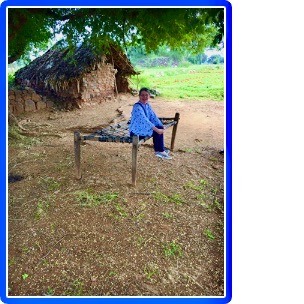
(Mom at a farmer’s hut in rural Chennai, India.)
This was our conversation when we were in rural India!
“Oh fairest of women… go out by the shepherd’s shelter..,” I encouraged. (1:8)
To which Mom said, “While the king was on his couch, my nard gave off its scent.” (1:12)
Yes, yes, I thought, it’s going to be a good day. What else should I say? I know, “O you are fair, my lover… our bed is verdant, too.” (1:16)
Mom responded, “Like a quince tree among the trees of the forest, so my lover among the forest. In its shade I delighted to sit, and its fruit was sweet to my taste.” (2:3)
“Look, Solomon’s bed!” she proclaimed. (3:7)
“What a stud I am!” I boastfully thought. (Extra biblical text not found in the Hebrew Bible)
Why are such graphic, sexual physical descriptions found in the Bible? Because it is precisely the most natural, most human characteristic we possess. Unfortunately, in my opinion, my church — the Catholic Church — still doesn’t get it. Natural human behavior is clothed in pious (and often sanctimonious) language from celibate priests with negative connotations of sin and hell. I don’t know, perhaps they still want to maintain control of the people like in the Middle Ages, but unfortunately for them, today the people are smarter than the priests. Fortunately, I think Pope Francis is starting to “get it.” After all, “who am I to judge” (Pope Francis in a 2013 interview on his book, Mercy).
Have a good week…
Love,
Dad
P.S. Songs of strong, black women are found often in hip-hop, especially from female singers. Tupac is a complex figure. On the one hand, he was often involved in violent situations, and on the other, many of his songs preach against many social injustices. Here is one about the wonderful role of strong, black women.
Crank it up!
youtube
https://www.youtube.com/watch?v=VYaR6LOnkak
Little somethin' for my godson Elijah and a little girl named Corinne
Some say the blacker the berry, the sweeter the juice
I say the darker the flesh then the deeper the roots
I give a holler to my sisters on welfare
Tupac cares, if don't nobody else care
And uh, I know they like to beat ya down a lot
When you come around the block brothas clown a lot
But please don't cry, dry your eyes, never let up
Forgive but don't forget, girl keep your head up
And when he tells you you ain't nuttin' don't believe him
And if he can't learn to love you, you should leave him
'Cause sista you don't need him
And I ain't tryin' to gas ya up, I just call 'em how I see 'em
You know it makes me unhappy (What's that)
When brothas make babies, and leave a young mother to be a pappy
And since we all came from a woman
Got our name from a woman and our game from a woman
I wonder why we take from our women
Why we rape our women, do we hate our women?
I think it's time to kill for our women
Time to heal our women, be real to our women
And if we don't we'll have a race of babies
That will hate the ladies, that make the babies
And since a man can't make one
He has no right to tell a woman when and where to create one
So will the real men get up
I know you're fed up ladies, but keep your head up
Keep ya head up, ooh, child, things are gonna get easier
Keep ya head up, ooh, child, things'll get brighter
Keep ya head up, ooh, child, things are gonna get easier
Keep ya head up, ooh, child, things'll get brighter
Aiyyo, I remember Marvin Gaye, used to sing to me
He had me feelin' like black was tha thing to be
And suddenly tha ghetto didn't seem so tough
And though we had it rough, we always had enough
I huffed and puffed about my curfew and broke the rules
Ran with the local crew, and had a smoke or two
And I realize momma really paid the price
She nearly gave her life, to raise me right
And all I had to give her was my pipe dream
Of how I'd rock the mic, and make it to tha bright screen
I'm tryin' to make a dollar out of fifteen cents
It's hard to be legit and still pay your rent
And in the end it seems I'm headin' for tha pen
I try and find my friends, but they're blowin' in the wind
Last night my buddy lost his whole family
It's gonna take the man in me to conquer this insanity
It seems tha rain'll never let up
I try to keep my head up, and still keep from gettin' wet up
You know it's funny when it rains it pours
They got money for wars, but can't feed the poor
Said it ain't no hope for the youth and the truth is
It ain't no hope for tha future
And then they wonder why we crazy
I blame my mother, for turning my brother into a crack baby
We ain't meant to survive, 'cause it's a setup
And even though you're fed up
Huh, ya got to keep your head up
Keep ya head up, ooh, child, things are gonna get easier
Keep ya head up, ooh, child, things'll get brighter
Keep ya head up, ooh, child, things are gonna get easier
Keep ya head up, ooh, child, things'll get brighter
And uh
To all the ladies havin' babies on they own
I know it's kinda rough and you're feelin' all alone
Daddy's long gone and he left you by ya lonesome
Thank the Lord for my kids, even if nobody else want 'em
'Cause I think we can make it, in fact, I'm sure
And if you fall, stand tall and comeback for more
'Cause ain't nothin' worse than when your son
Wants to kno' why his daddy don't love him no mo'
You can't complain you was dealt this
Hell of a hand without a man, feelin' helpless
Because there's too many things for you to deal with
Dying inside, but outside you're looking fearless
While the tears, is rollin' down your cheeks
Ya steady hopin' things don't all down this week
'Cause if it did, you couldn't take it, and don't blame me
I was given this world I didn't make it
And now my son's gettin' older and older and cold
From havin' the world on his shoulders
While the rich kids is drivin' Benz
I'm still tryin' to hold on to my survivin' friends
And it's crazy, it seems it'll never let up, but
0 notes
Text
Canticle Thanks
So, my very first tumblr smut has had a bit of a renaissance today which is super awesome! Thanks for reading it! There have been a few similar comments with similar thoughts so I figured I’d take a minute to post a thanks to all the new readers/commenters/rebloggers/likers but also to throw some knowledge at you all (because then I can count my tumblr surfing as work hours since this knowledge comes from my field of study/work)!
Read Canticle Here
@thegreatficmaster reblogged this from impalasutra and added:
Sexing up god…BLASPHEMOUS!But I loved it!!So hot!!Goddamn…the way he ate me out…I have no idea what those poems were…but...
@archangels-lollipop said:
This was gorgeous! The poetry was a beautiful touch!
So, there were a few comments about the poetry that the reader and Chuck recite to one another while they’re getting down and dirty. And here’s the knowledge... are you ready?
Friends, the poetry is all from the Bible.
“Wait, whaaaaaaat?” you might be thinking, “that poetry was distinctly sexy/erotic. There’s no way that’s in the Bible.” Well, gentle reader, it is! It comes from a book of the Old Testament that has a few different names, depending on which translation of the Bible you’re looking at. It’s either called Song of Solomon, Song of Songs, or Canticle of Canticles (bet you can’t guess where I got the title for the fic...). The long and short of it is that Song of Songs is an erotic poem smack dab in the middle of the Old Testament of the Bible (or just in “The Bible” for my Jewish readers out there).
This could get long so I’m gonna go ahead and throw a cut in here in case you’ve had enough Bible learning for one post. But if anyone is interested, there’s more about Song of Songs (most Biblical scholars’ preferred title for the book) if you click “Keep Reading”
So, Song of Songs, Canticle of Canticles... it’s a GREAT book but one that so often gets over looked. It’s short, it’s poetry, and it gets down right erotic. Yup, the Bible talks about sex in more than a “Thou shall not...” kind of way. There are three distinct characters in the book - a young girl, a young boy, and the women of Jerusalem. Now, when I say young, I mean 12-14ish, which wasn’t all that young back then but to our modern sensibilities is quite young, especially for sex stuff. Note: Some scholars disagree that they’re quite young and prefer, instead, to call them a man and a woman. My Hebrew professor was all about their youth, though, so that’s where I tend to land on the matter, too.
The Song itself is a long poem about sexual love and erotic desire. The human body is celebrated as both an object of desire and a source of delight (aka the pleasure part of sex). The young lovers basically play hide and seek all night - not really, but they’re searching for each other - while they talk about how much they love each other, how hot the other one is, and make thinly veiled references to sex. Throughout the poem, the women of Jerusalem act as a sort of Greek Chorus and they cheer the lovers on as they serve as the reader’s entry into the poem.
Oh, also, most scholars agree that the young couple isn’t married. So not only is there sex in the Bible but it’s premarital sex. GASP! There are no finicky “family values” to get in the way here! Song of Songs is all about the pleasure of sex. The lovers’ desire for one another - not marriage, not having children, just their desire - is the central theme of the poem.
Another fun fact is that Song of Songs is kind of inherently queer. Though it is about a young girl and young boy, the gender norms that we have come to expect from Biblical texts are absent and, in their place, is a refreshingly open attitude toward gender. The young girl pushes back against men mentioned throughout the poem - her brothers and the city guard - and the women of Jerusalem praise her for it. There also isn’t any hierarchy within the lovers’ relationship. The girl states that she belongs to her love and, in the same breath, that he belongs to her as well. This equality (among other things) makes the couple deviant in the public eye and the girl suffers because of it. She talks about how she longs for her mother’s approval of her relationship but is afraid she won’t get it, a very real situation for many young (and not-so-young) queer people.
Oh, and some modern scholars like to say that Song of Solomon - because these scholars seem to be the ones to hold tightest to the most contested of the book’s titles - is an allegory for Jesus and his love for the Church and there’s not actually young, unwedded love on display; that would be heinous! Well, I say that’s bullshit. There was no Jesus when the poem was written so there was nothing off that sort to write an allegory about. Can we, modern readers, read it that way? Yes. Should we? Not really; I mean, it makes a nice point for my fellow Christians out there but that’s really not how it was intended. Most progressive scholars agree that reading Jesus into the bulk of the Old Testament is pretty poor interpretive work.
So, anyhow, that’s your Bible learning for today. Hope it was fun for you!
With Love,
Rev, your friendly neighborhood Bible scholar and smut writer
So, I didn’t really source anything in this post because it was all things that I have absorbed throughout my scholarly life. However, if you’re looking for some things to read, I’ve got some suggestions. There are a couple of books that I used a lot while writing papers about this kind of thing in grad school and they’ll have the info to support most of the points I made:
Take Back the Word: A Queer Reading of the Bible, edited by Robert E Goss and Mona West, published by The Pilgrim Press, 2000
Unprotexted Texts: The Bible’s Surprising Contradictions about Sex and Desire by Jennifer Wright Knust, published by Harper One, 2011
Song of Songs: A Commentary by J. Cheryl Exum, published by Westminster John Knox, 2005
#song of songs#bible stuff#learning#NOT SPN#not really spn#but kind of because it's about one of my fics#or at least inspired by one of my fics
8 notes
·
View notes
Photo

Daily #haiku and #Bible journaling her tent is open children joyfully bursting forth they will know peace 12-28-2018 #Christmas 4 Isaiah 54:1-13 Revisiting Isaiah. Today, I am struck by the imagery again of a barren woman (Hannah and so many others) who are able to have children. There is a lot of metaphor/symbol in this scripture. First, often, Israel is called the Bride of God. Here, God is nearly admitting that he deserted her but that the covenant still holds. She will still have children more numerous than the stars (Gen 26:4) or here, more numerous than other nations. To continue the female imagery, one thing to be aware of is the imagery of tents as a metaphor of a woman's reproductive system. This barren woman is to "enlarge the site of the tent, stretch the drapes of the dwellings, don't hold back, lengthen your tent ropes, strengthen your stakes" … "and your children will possess the nation's land" (verses 2-3). The tent is not a tent. For scholarly work on tents in the Bible, see Dr. Erica Martin and others. This really brings a different meaning to Gen. Sisera entering Jael's tent and her violent reaction (Judges 4:17-24, 5:24-27). Also, why he would fall asleep so quickly. #amiright? Maybe we should have a book "The Bible Code" that has a lexicon that is like (stop here if you don't want to read the plain English):��LORD = YHWH Tent = vagina Foot = penis And so on. Of course, these are biblical euphemisms so every time you see tent does not mean a vagina, but a lot of the times when we see tent it does! For #leaders, we should be open to learning the unwritten stories that exist in our organization's lore. Resource: Unprotected Texts by Jennifer Wright Knust #nonbinary #gendernonconforming #GNC #Lgbtq #queer #Poetry #UMC #Christianity #Poems #PNWUMC #Scripture #Seattle #BibleJournaling #Pastor #Chaplain #biblestudy #biblereading #leadership #leaders #followership #artjournal #dailydevotional #faithfullylgbt https://www.instagram.com/p/Br70-u8h_H1/?utm_source=ig_tumblr_share&igshid=1uxsm0yv10m6w
#haiku#bible#christmas#amiright#leaders#nonbinary#gendernonconforming#gnc#lgbtq#queer#poetry#umc#christianity#poems#pnwumc#scripture#seattle#biblejournaling#pastor#chaplain#biblestudy#biblereading#leadership#followership#artjournal#dailydevotional#faithfullylgbt
0 notes
Photo

Unprotected Texts
the Bible's Surprising Contradictions about Sex and Desire by Jennifer Wright Knust
"Marked by the human histories and vulnerable lives of the people who wrote it and also by the ongoing interpretations of those who have read it, the Bible is not perfect, but it can still be regarded as beautiful, particularly when we do not try to force it to mean just one thing." (pg 247)
"It is therefore a mistake to pretend that the Bible can define our ethics for us in any kind of straightforward way: such an interpretive strategy will only leads us astray while also preventing us from taking the Bible as seriously as we should." (pg 245)
"... a refusal to acknowledge that we are active interpreters might make it seem as if the only possible choice is between accepting the Bible as literally true or rejecting the Bible altogether." (pg 245)
"Since neither the Bible nor a particular interpretation can limit what particular stories and teachings must mean, it is up to readers to decide what a biblically informed and faithful sexual morality might look like." (pg 245)
We considered animal domestication, in particular chickens, alongside using eggs to make banana bread. To be so linked, and utilize, a reproductive process for a chicken it is interesting to consider the Bible and what Jennifer had to say. It was good banana bread too.
0 notes
Quote
Anyone who uses either God or the Bible to preach hate or to deny love and affection to others has failed as both a lover of the Bible and a person of faith.
Jennifer Wright Knust, "What does the Bible say about sexual desire?"
1 note
·
View note
Text

Week two of the new routine. This will be the second week that I’ve been coming to campus to do schoolwork in the mornings, and going to the gym in the afternoon two times a week. So far it feels good.
My advisor and I have added another book to my thesis research pile. It’s ‘Unprotected Texts’ by Jennifer Wright Knust. I plan to start it today, so I’ll give an update on what I think.
I’m five chapters in to ‘Sex and the Single Savior’ and I’m finding it both useful and hilarious. It’s definitely worth a read if you’re into Religious/ Christian studies.

#aelstudies#dark academia aesthetic#dark academia#sex and the single savior#Dale B. Martin#unprotected texts#Jennifer wright Knust#Homosexuality in the Biblical World#university student#university life#university studyblr#studyblr#religious studies
2 notes
·
View notes
Text
Buds or Beloveds
Sunday Evening Thoughts
October 6, 2019
Buds or Beloveds
Dear Paul and Rachel,
When David had finished speaking to Saul, the soul of Jonathan was bound to the soul of David, and Jonathan loved him as his own soul.
1 Samuel 18:1
In reading the Hebrew Scriptures from the beginning again this summer, I’ve been concentrating on reading them in a different light. Namely, what motive is behind the authors’ writings? This is a little trickier than it sounds, because you must first look for the correct time period of the story, prayer on a character’s lips, or song that is sung, and then determine the historical matrix of time and culture when it is first incorporated into the biblical text. For the moment, any later further redactions of the Hebrew or Greek texts I’ve ignored, though it is often present. So original ancient songs and stories of 1,200-1,000 BCE often have a different significance when used by the current authors of most Hebrew texts, roughly 500-300 BCE.
As I’ve indicated in the first couple of S.E.T’s. this year, there is often a strong political (and economic!) inclination to the message. Follow the money! Of course, in the ancient world and in the Hebrew Scriptures, this includes lots of violence: War after war after war. Hardly an image of a loving God!
In studying I and II Samuel, there is no difference in violence between these books and the first 5-7 books in the Bible. David doesn’t just fight Goliath; he decapitates him after he kills him with a rock. Once again, the full story of David and Goliath is not a bedtime reading story for little kids, if read in total from the Bible.
But one little respite from the violence in the stories has been to read and study the relationship between David and Jonathan. So let’s get to the juicy question: Were they lovers/beloveds or simply best buds?
First, let’s look at the various texts surrounding this question of David and Jonathan:
When David had finished speaking to Saul, the soul of Jonathan was bound to the soul of David, and Jonathan loved him as his own soul… Then Jonathan made a covenant with David, because he loved him as his own soul. Jonathan stripped himself of the robe that he was wearing, and gave it to David, and his armor, and even his sword and his bow and his belt... 1 Samuel 18:1-5
But Saul’s son Jonathan took great delight in David. 19:1
But David also swore, “Your father knows well that you like me; and he thinks, ‘Do not let Jonathan know this, or he will be grieved.’ … Then Jonathan said to David, “Whatever you say, I will do for you.” 20:3-4
Jonathan said to David, “… But if my father intends to do you harm, the Lord do so to Jonathan, and more also… 20:12-13
Then Saul’s anger was kindled against Jonathan. He said to him, “You son of a perverse, rebellious woman! Do I not know that you have chosen the son of Jesse to your own shame, and to the shame of your mother’s nakedness? 20:30
Then Jonathan answered his father Saul, “Why should he be put to death? What has he done?” But Saul threw his spear at him to strike him; so Jonathan knew that it was the decision of his father to put David to death. Jonathan rose from the table in fierce anger and ate no food on the second day of the month, for he was grieved for David, and because his father had disgraced him. 20:32-34
… David rose from beside the stone heap and prostrated himself with his face to the ground. He bowed three times, and they kissed each other, and wept with each other; David wept the more. 20:41
Then Jonathan said to David, “Go in peace, since both of us have sworn in the name of the Lord, saying, ‘The Lord shall be between me and you, and between my descendants and your descendants, forever.’” 20:42
… He [Jonathan] said to him [David], ‘Do not be afraid; …Then the two of them made a covenant before the Lord… 23:16-18
David intoned this lamentation over Saul and his son Jonathan. He ordered that The Song of the Bow be taught to the people of Judah… I am distressed for you, my brother Jonathan; greatly beloved were you to me; your love to me was wonderful, passing the love of women. II Sam 2:1,26.
The traditional Christian view is that David and Jonathan were simply good buds. They had a platonic relationship. There was no homoerotic relationship — homosocial, yes; homosexual, no. There are no direct texts that state David and Jonathan had sex.
When thinking about David and Jonathan’s relationship, I chuckled because I remember a Will Ferrell (of SNL and Elf fame) interview describing his fraternity at U. of Southern Cal. He said his fraternity had become very sexist toward women on campus, and more often than not simply counted how many women they could score at frat parties after getting them drunk. So he expressed at a frat meeting that they should definitely keep women out, except for parties. And in further Will Farrell humor, he motioned at a frat meeting that to show their bro-hood, they should, “all take off their clothes and hug each other!”
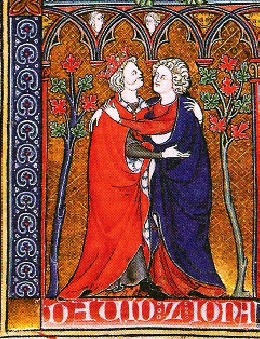
"La Somme le Roy", 1290 AD. This picture might be just buds giving a hug.
Traditional scholars take each of the texts above and give explanations that are plausible. For example, in the first text above from 18:1-5 where “Jonathan makes a covenant with David,” their explanation is Jonathan agrees to recognize David as the new heir to the throne of Israel, and David accepts that recognition. Further, with the theological significance of the Davidic Throne throughout Jewish history, this acknowledgement makes perfectly good sense. And for Christians later in their theology of Jesus, all of the Gospel writers trace Jesus’ lineage back to David, which is especially important in the Gospel of Luke — though in Luke it is to be used as a contrast to the riches (wealth) and power (military) of David to the richness of poverty (“Blessed are the poor” Luke 6:20 – note: not poor in spirit) and the power of nonviolence (“But Jesus said, No more of this!” Luke 22:51 after a disciple cut off the ear of a guard, mentioned as Malchus in the Gospel of John), which is rarely emphasized by some of these traditional scholars.
Most modern scholars of the last 50 years do not accept the platonic position. Jonathan’s love for David exceeding his love for himself implies more than simply friendship. Jonathan’s willingness to die for David if his father strikes him is more than allegiance. Saul’s reaction to Jonathan and David’s relationship, calling his own son a son-of-a-bitch (“you son of a perverse, rebellious woman”), is further evidence supporting their gay relationship. Later Saul threatens to disown Jonathan if Jonathan does not break off his and David’s relationship. (I suspect many young gay people today have experienced this reaction from their parents!) Finally, David’s expression of Jonathan’s love for him “surpassing the love of a woman” describes their emotional and physical affection.
So, how do I see it? (Do you really care how I see it? Lol…).
One modern historical biblical scholar, Michael Coogan (Professor of Semitic Languages at Stonehill College and Harvard, Editor of the Oxford Annotated New Revised Standard Version (the bible of Bibles for serious academic studies in colleges), and the author of God and Sex: What the Bible Really Says), writes that he cannot conclude absolutely that David and Jonathan were lovers. He says there are plenty of indications to think that, but no certainty. And, for the record, I like his writings and highly respect him.

I highly recommend this book if you want to know what the Bible says, and equally does not say, about sex.
On the other hand, Susan Ackerman (Professor of Religion at Dartmouth), author of When Heroes Love: The Ambiguity of Eros In Stories of Gilgamesh and David, notes that there is much ambiguity about their relationship, yet the overwhelming evidence points toward David and Jonathan as partners.

Also, Jennifer Wright Knust, a professor from Duke and author of Unprotected Texts: The Bible’s Surprising Contradictions about Sex and Desire is very certain that David and Jonathan are a couple.
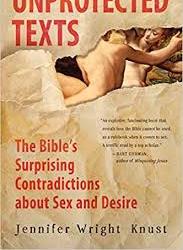
To me, Coogan is correct that the text does not state David and Jonathan had sex, but I think he errs in that many issues in the bible never state exactly the area of discussion, but the implied meaning is clear. One might be able to explain away any one of these David-Jonathan texts, but I think it is disingenuous to collectively dismiss all of them.
The overall story clearly implies that David and Jonathan are more than friends. It implies that they are lovers.
One other fascinating anecdote about the David and Jonathan story is that according to the texts both men had many wives, and children from several of them. Perhaps they are indeed the sexually ambiguous models of the LGBT community today, but I’ll leave that for another Thought.
Have a good week…
Love,
Dad
P.S. Donatello certainly had his thoughts about David’s gender identity…
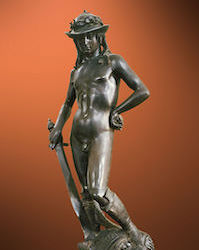
This song sung on the TV show Glee expresses David and Jonathan pretty well, but, full disclosure, this song is one of your little brother’s least favorite Broadway plays, “Take Me or Leave Me,” Rent.
Crank it up!
youtube
0 notes
Photo

Daily #haiku and #Bible journaling her tent is open children joyfully bursting forth they will know peace 12-28-2018 #Christmas 4 Isaiah 54:1-13 Revisiting Isaiah. Today, I am struck by the imagery again of a barren woman (Hannah and so many others) who are able to have children. There is a lot of metaphor/symbol in this scripture. First, often, Israel is called the Bride of God. Here, God is nearly admitting that he deserted her but that the covenant still holds. She will still have children more numerous than the stars (Gen 26:4) or here, more numerous than other nations. To continue the female imagery, one thing to be aware of is the imagery of tents as a metaphor of a woman's reproductive system. This barren woman is to "enlarge the site of the tent, stretch the drapes of the dwellings, don't hold back, lengthen your tent ropes, strengthen your stakes" … "and your children will possess the nation's land" (verses 2-3). The tent is not a tent. For scholarly work on tents in the Bible, see Dr. Erica Martin and others. This really brings a different meaning to Gen. Sisera entering Jael's tent and her violent reaction (Judges 4:17-24, 5:24-27). Also, why he would fall asleep so quickly. #amiright? Maybe we should have a book "The Bible Code" that has a lexicon that is like (stop here if you don't want to read the plain English):LORD = YHWH Tent = vagina Foot = penis And so on. Of course, these are biblical euphemisms so every time you see tent does not mean a vagina, but a lot of the times when we see tent it does! For #leaders, we should be open to learning the unwritten stories that exist in our organization's lore. Resource: Unprotected Texts by Jennifer Wright Knust #nonbinary #gendernonconforming #GNC #Lgbtq #queer #Poetry #UMC #Christianity #Poems #PNWUMC #Scripture #Seattle #BibleJournaling #Pastor #Chaplain #biblestudy #biblereading #leadership #leaders #followership #artjournal #dailydevotional #faithfullylgbt https://www.instagram.com/p/Br70-u8h_H1/?utm_source=ig_tumblr_share&igshid=cs7gppqj93rx
#haiku#bible#christmas#amiright#leaders#nonbinary#gendernonconforming#gnc#lgbtq#queer#poetry#umc#christianity#poems#pnwumc#scripture#seattle#biblejournaling#pastor#chaplain#biblestudy#biblereading#leadership#followership#artjournal#dailydevotional#faithfullylgbt
0 notes
Quote
The Bible is simply too complicated and too contradictory to serve as a guide to sexual morals. Treating the Bible as a rulebook impoverishes the biblical witness and short-circuits our ability to speak honestly about sex. Since the Bible never offers anything like a straightforward set of teachings about marriage, desire, or God's perspective on the human body, the only way to pretend that it does is to refuse to read it.
If we do take the time to read the Bible, we are likely to discover that the biblical writers do not agree with us, whatever version of sexual morality we are seeking to promote. Written more than 2,000 years ago at a significant historical and cultural distance, the Bible gathers together a diverse collection of ancient books, edited over time, not a coherent, divinely inspired set of instructions that can easily be applied. Tracing even a few, limited topics from one biblical book to another can make the point: If one book forbids marriage between foreigners and Israelites, the next depicts such marriages as a source of blessing, not only to Israel but to all of humankind. If one insists that women are saved by childbearing, the next recommends that women avoid childbearing altogether in order to devote themselves more fully to God. If one suggests that sex with a relative, the wife of another man, or with a male lover will certainly lead to the nation's downfall, the next depicts heroic kings engaging in precisely these forms of sex. And these are just a few examples. Is it any wonder, then, that the Bible has failed to settle current debates about what a divinely sanctioned sexual morality might look like? Perhaps it is time to stop pretending that it can.
Jennifer Wright Knust, "Debunking 'Biblical marriage': Why the Bible can't dictate today's sexual morals"
1 note
·
View note